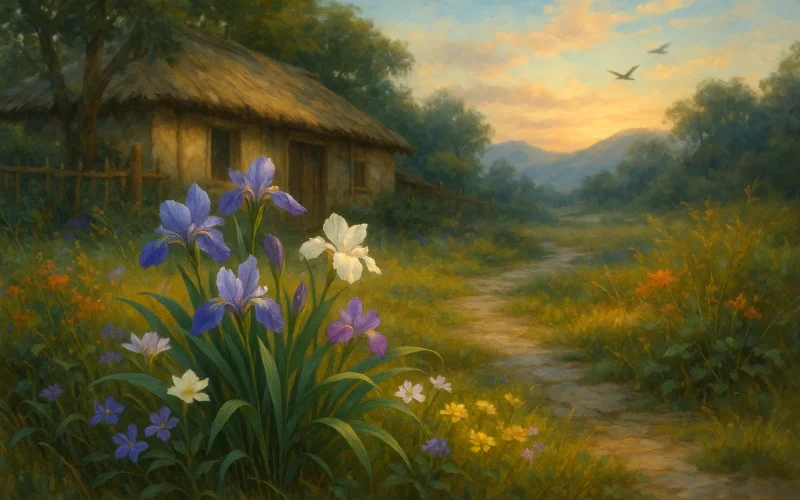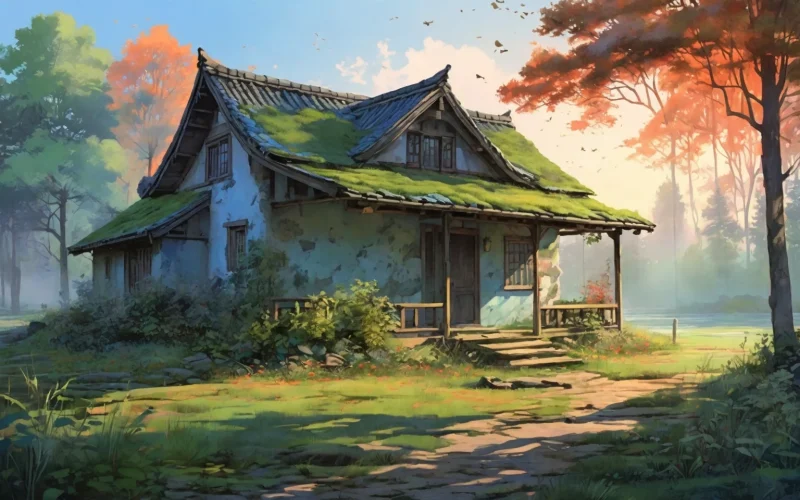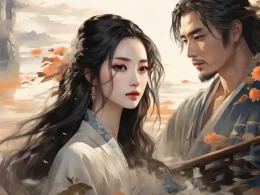Sweet orchid in the front yard grows,
With fragrance waiting for the breeze.
The welcome breeze rises and blows,
Sweeping the weeds breeding disease.
In life's journey I lost my way
Until I see a gleam of light.
I know I'd hide my bow and stay
At home when there's no bird in flight.
Original Poem
「饮酒 · 其十七」
陶渊明
幽兰生前庭,含薰待清风。
清风脱然至,见别萧艾中。
行行失故路,任道或能通。
觉悟当念还,鸟尽废良弓。
Interpretation
Composed during Tao Yuanming's later reclusive years in the Eastern Jin dynasty, this work reflects his complete disillusionment with officialdom after repeated frustrations and profound disappointment with corrupt politics. Having retreated to rural self-sufficiency, Tao pursued spiritual independence and inner freedom. "Drinking Wine No. 17" emerges from this mindset—while having abandoned political aspirations, he maintains vigilant contemplation of worldly affairs. Using secluded orchids as metaphor, the poem expresses his adherence to noble character and wariness of bureaucratic ruthlessness, revealing the deepened clarity of his post-retirement philosophy.
First Couplet: "幽兰生前庭,含熏待清风。"
Yōu lán shēng qián tíng, hán xūn dài qīng fēng.
Fragrant orchids bloom before my hall, Their hidden scent awaits the breeze's call.
The poet allegorizes himself as orchids—their subtle fragrance symbolizing noble integrity, while "awaiting the breeze" suggests hope for virtuous recognition. This couplet establishes the poem's symbolic framework through natural imagery.
Second Couplet: "清风脱然至,见别箫艾中。"
Qīng fēng tuō rán zhì, jiàn bié xiāo ài zhōng.
When pure winds come without constraint, They stand distinct from vulgar plant.
"Vulgar plant" (箫艾) represents mediocre crowds, contrasting the orchids' distinction. Though dwelling among common weeds (retirement), the poet affirms his moral superiority over petty bureaucrats.
Third Couplet: "行行失故路,任道或能通。"
Xíng xíng shī gù lù, rèn dào huò néng tōng.
Walking on, I lose my former way; Yielding to Dao may clear passageway.
Transitioning from flora to human journey, this couplet acknowledges life's disorientations while proposing Daoist resolution—harmony with nature's flow as potential guidance through confusion.
Fourth Couplet: "觉悟当念迁,鸟尽废良弓。"
Jué wù dāng niàn qiān, niǎo jìn fèi liáng gōng.
Awakened, heed change's constant part— Perfect bows discard when birds depart.
The historical allusion to "discarded bows after finished hunt" (鸟尽弓藏) critiques political ingratitude, justifying his reclusion as prescient withdrawal before inevitable betrayal.
Holistic Appreciation
"Wine-drinking Song XVII" employs allegorical construction throughout, using the "secluded orchid" as self-representation and contrasting "pure breeze" with "common mugwort" to illustrate the dichotomy between nobility and vulgarity. This demonstrates how the poet, though dwelling in wilderness and humble circumstances, steadfastly maintains his virtuous character. The contemplative tone about losing one's way yet finding natural paths leads to sudden enlightenment regarding fame and gain. The concluding historical allusion to "discarded bows after finished hunt" (鸟尽弓藏) reveals the fickleness of human relationships and worldly affairs, subtly conveying both wariness of reality and profound awakening. Despite its brevity, the poem develops its philosophy from simple to profound.
Artistic Features
The poem adopts the "stimulus-evocation" technique (以物起兴), weaving imagery of orchids, breezes and mugwort into a complete symbolic structure that is both visually evocative and philosophically profound. Its language is naturally simple yet poetic, with a structure progressing from stillness to motion, from objects to human experience. The concluding historical reference serves as a poignant enhancement, adding contemporary relevance and intellectual depth to the entire work.
Insights
This poem teaches us that amidst worldly chaos and vicissitudes, maintaining one's integrity is like the orchid's fragrance - persisting in its nature even when unappreciated. It also reminds us that life's journey often involves losing one's way, but by following natural courses and remaining true to oneself, one will ultimately find clarity. Most importantly, it warns against obsession with fame and fortune, urging timely recognition of circumstances. Like the historical lesson of "discarded bows after the hunt," we must awaken to reality and retreat appropriately to preserve our character and achieve personal fulfillment.
Poem translator
Xu Yuanchong (许渊冲)
About the poet

Tao Yuanming(陶渊明), 365 – 427 CE, was a poet, literary figure, fu writer, and essayist active during the late Eastern Jin and early Liu Song dynasties. Born in Chaisang (near present-day Jiujiang, Jiangxi Province), he pioneered a new genre of pastoral-themed literature, expressing profound philosophical insights through simple language. His poetic style became an enduring aesthetic standard in classical Chinese poetry.











